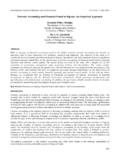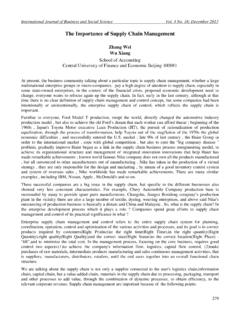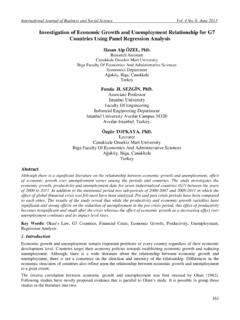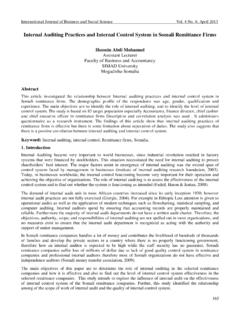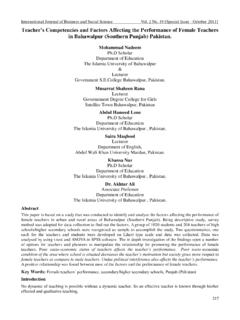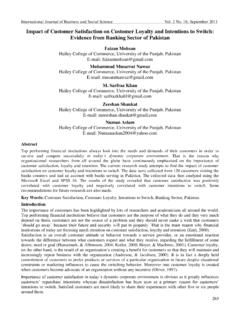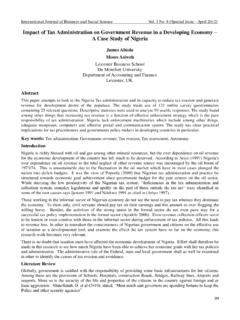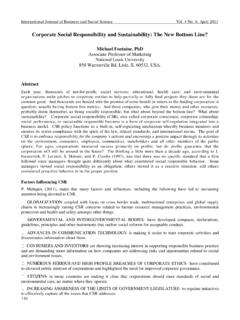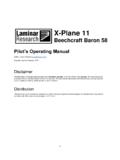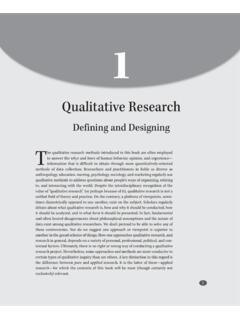Transcription of Theory of Complex Interdependence: A Comparative …
1 International Journal of Business and Social Science Vol. 6, No. 2; February 2015. Theory of Complex interdependence : A Comparative Analysis of Realist and Neoliberal Thoughts Waheeda Rana PhD Scholar at Quaid- i-Azam University Islamabad & Assistant Professor at International Islamic University Islamabad Abstract The post-Cold War era witnessed a realization among the nation-states that the criteria for achieving real power was something beyond hard power, rather it required a secure economic and technological advancement.
2 This led to an interesting debate between realists and liberals, each trying to convince that their arguments were more valid and relevant to prevailing global trends. In the context of this debate, this paper seeks to critically analyze the Theory of Complex interdependence ' which challenged the fundamental assumptions of traditional and structural realism . Complex interdependence became a central component of the neoliberal perspective. It highlighted the emergence of transnational actors vis- -vis the state.
3 Complex interdependence model tried to synthesize the realist and liberal perspectives. Thus the main aim of this paper is to carry out a Comparative analysis of realist and neoliberal schools of thought and to explore the prevalence of these approaches in the contemporary world politics. The major conclusion of this paper is that following the rise of international regimes and institutions, the traditional military capabilities have been compensated with the importance of welfare and trade in foreign policy matters.
4 It concludes that the neoliberal perspective has attained much importance and there is an obvious willingness among the states to enter into cooperative alliances with one another under conditions of anarchy and dependence even. Keywords: Neoliberalism, realism , interdependence , Transnational, International Regimes 1. Introduction The post-Cold War world underwent great transformation. The political agendas of traditional military power and national security were now dominated by the actors' quest for a stable and peaceful global order conducive to their economic development (Bhatty, 1996: 4).
5 There was realization among the developed countries that the criteria for achieving real power is no more the sophisticated weapons and large military establishments alone, rather it required a secure foundation through economic efficiency and technological advancement. Following these developments, an interesting debate started between realists and liberals, each trying to convince that their arguments were more valid and relevant to prevailing global trends. The model of Complex interdependence ' was developed by Robert O Keohane and Joseph S.
6 Nye in the late 1970s. It was a major challenge to fundamental assumptions of traditional and structural realism which focused on military and economic capabilities to explain state behavior. Complex interdependence on the contrary highlighted the emergence of transnational actors vis- -vis the state. Focus was the rise of international regimes and institutions that compensated traditional military capabilities and the new importance of welfare and trade in foreign policy matters compared to status and security issues.
7 Complex interdependence actually became a central component of the neoliberal perspective and has been widely used in the analyses of international politics making an attempt to understand willingness of states to enter into cooperative alliances with one another under conditions of anarchy and dependence. While emphasizing the growing importance of International Organizations (IOs) and Multinational Corporations (MNCs), this Theory is said to have anticipated what is now known as Globalization. Keohane and Nye argued that in the era of interdependence , the very nature of international relations has been changed and world has become more interdependent in all respects especially economics.
8 This Theory tried to synthesize the realist and liberal perspectives. It did not altogether reject realism rather it raised the concern that at times there emerged certain situations where realists' assumptions/explanations were not sufficient. 290. ISSN 2219-1933 (Print), 2219-6021 (Online) Center for Promoting Ideas, USA In this paper while focusing on Theory of Complex interdependence , a Comparative analysis of realist and neoliberal schools of thought would be carried out in order to explore the prevalence of these approaches in contemporary world politics.
9 2. Theory of Complex interdependence In the contemporary globalized world, the term interdependence ' is frequently used. It is a situation in the world politics where all the actors including states as well as non-state actors, are dependent upon one another. In general terms, Dependence means a state of being determined or significantly affected by external forces. interdependence , most simply defined, means mutual dependence. interdependence in world politics refers to situations characterized by reciprocal effects among countries or among actors in different countries.
10 (Keohane& Nye, 1977: 8). Under this mutual dependence, the relationship between the actors involved, including states as well as other transnational actors, is characterized by both cooperation and competition. In interdependence there are costly reciprocal effects of transaction among the actors. The policies and actions of one actor have profound impact on the policies and actions of the other actors and vice versa. interdependence does not only mean peace and cooperation among actors, but a relationship between actors characterized by cooperation, dependence, and interaction in a number of different areas, and conflict as well.
